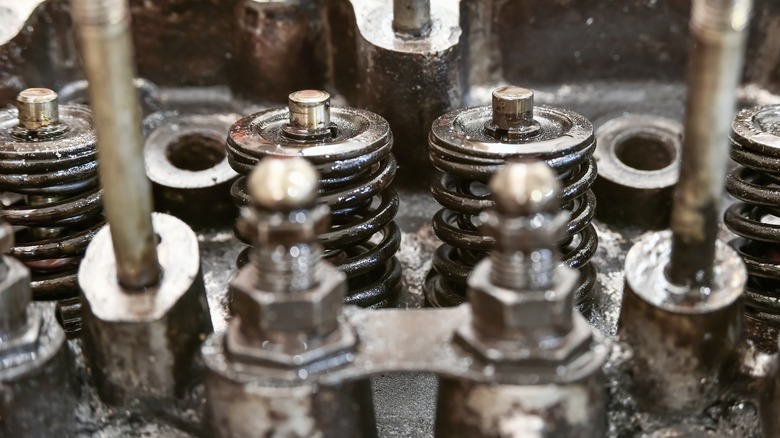What Causes Lifter Tick In An Engine (And Can It Be Fixed?)
Cars are intricate machines that rely on a series of chemical and mechanical processes to work properly. When things go wrong with one of those processes, your car can start to make some strange noises. Automotive engines rely on valves to let the fuel-air mixture in and exhaust out, and most modern pushrod and overhead cam engines use lifters to open and close the valves. While the original Wankel rotary engine employed ports to let fuel in and exhaust out, later rotary engines used in some Mazda models had valves in the combustion chambers.
I only have a passing familiarity with rotary engines, but I have been working on cars for more than three decades. In that time, one engine noise I have become familiar with is lifter tick, which sounds like a piece of metal tapping on a hard surface in a rat-tat-tat pattern. Auto repairs can be costly and hard to estimate, so arming yourself with knowledge about possible problems and potential solutions can save you lots of money and help you avoid being taken advantage by a dishonest mechanic. With all that in mind, here are some things to know about the causes of lifter tick and what can be done to silence it.
What causes lifter tick depends on whether you have mechanical or hydraulic lifters
Engine lifters fall into two categories: mechanical and hydraulic. Mechanical lifters are also known as solid lifters and are essentially just metal cylinders. Hydraulic lifters have a plunger that acts as a mini shock absorber and usually operate without making noise. There are a host of reasons that these parts could result in a lifter tick.
Solid lifters require a precise gap between components; this is called valve lash. If valve lash is set incorrectly, this can cause lifter tick. Improper lubrication can also cause valve noise. This can be due to low oil pressure caused by leaks or a failing oil pump, or simply from waiting too long between oil changes. Worn, damaged, or misaligned mechanical lifters can also get noisy, as can hydraulic lifters if air gets trapped inside. Finally, a bent pushrod will also lead to improper valve operation and a ticking noise.
Quieting a lifter tick can sometimes be as simple as changing your oil and filter or topping off your oil. Sea Foam motor treatment can also help with lifter noise, as can other additives like Liqui Moly Hydraulic Lifter Additive and Marvel Mystery Oil, both of which can be found at most auto parts stores. If your pushrods, valve springs, or other valvetrain components are damaged or worn, rebuilding your cylinder head with new components may be necessary.
Some other engine noises can mimic lifter tick
Sometimes what you think is lifter tick might not be valve noise. Exhaust leaks will make the same rhythmic noises as lifter tick, although the sound will be more of a "putt-putt" and less of a "click-clack." These leaks can stem from a cracked manifold, faulty manifold or flange gasket, or even a loose or damaged spark plug.
Replacing a cracked manifold is the most expensive of these exhaust system repairs, but it will still be cheaper than having your heads rebuilt on most cars. This is a job you can do yourself, although it takes a substantial amount of time and patience. Summit Racing sells cylinder head rebuild kits for Ford 5.0-liter (302-cubic-inch) V8 engines for about $200, but you'll want to send the head itself out to a machine shop to have the valve seats reground and the mating surface milled flat. You can also buy a pre-assembled head and just bolt it on, but where's the fun in that?


